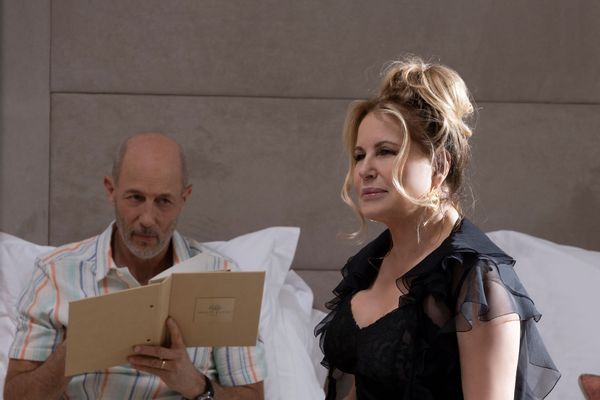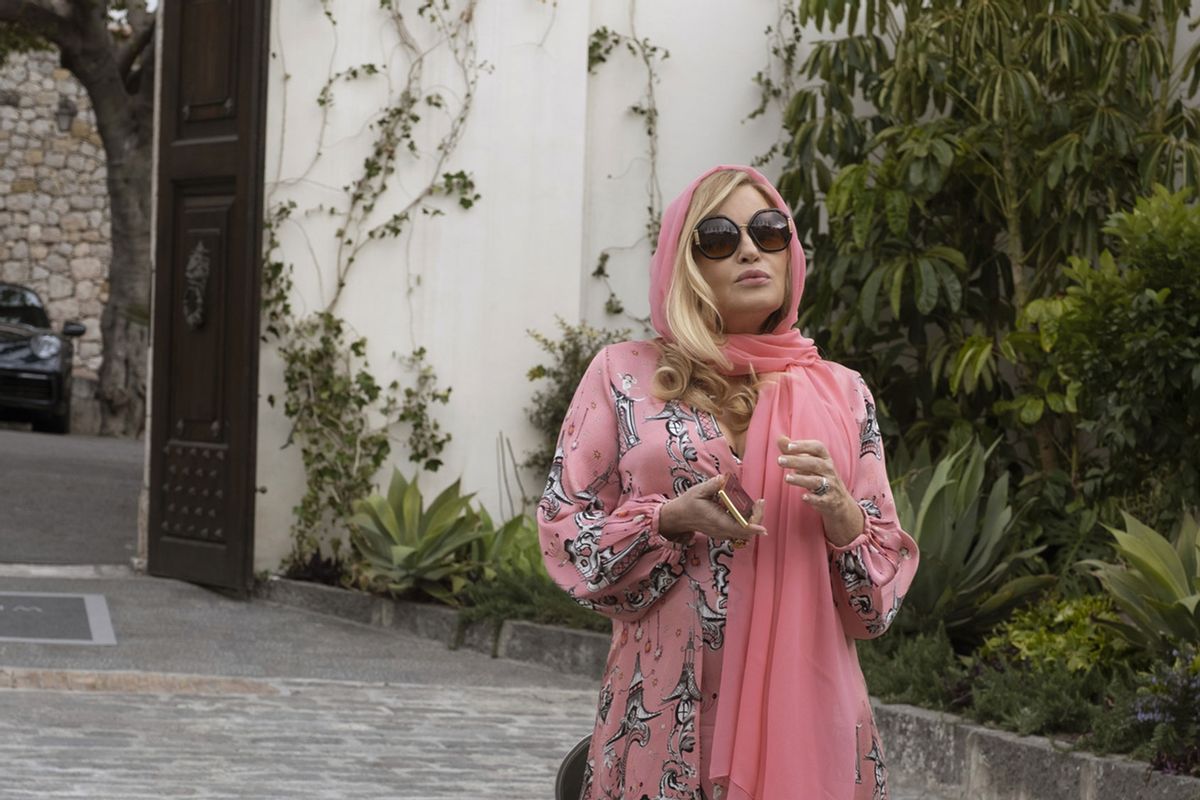"The White Lotus" introduces a defining motif of its Italian season, the Testa di Moro, shortly after the new arrivals have checked into their suites. These vibrantly colored ceramic busts are essentially Sicilian iconography, stemming from a legend in which a girl is seduced by a Moor. Upon hearing he intends to return home to his wife and children, she cuts off her lover's head.
The husband of one couple interprets it to mean, "If you come into my house, don't f**k my wife."
The wife opines that it's a warning to spouses: "Screw around, and you'll end up buried in the garden."
By that point we know bodies will drop, the same as in the first season. And while it's not the most original way in, series creator Mike White has been working in television for long enough to know and respect how valuable of a lure a murder mystery can be.
That assumption paid off in Season 1. Regardless of how irritating certain narrative choices were, the mystery developed magnificently, mainly because the stellar performance of that season's breakout star gave the outcome the emotional ballast most of its episodes lacked.
You may not want to be with the people you're watching, but the sights alone provided a level of escapism like little else on TV.
That said, it's tough to picture how the new season will top the image of Murray Bartlett defecating in a guest's suitcase. But the five hours provided for review tease many more reasons to remain engaged this time, the intoxicating visuals above all.
Even if the first round of "The White Lotus" didn't send you, its enthralling cinematography and the deliberate way with which its scenery is seamlessly edited into the narrative engulfs the viewer in sensuality. You may not want to be in the same room with the people you're watching, but the sights alone provided a level of escapism like nothing else on TV.
White set his first resort fantasy in a tropical paradise where his critiques of wealth and class played out through several sets of rich visitors, each of whom is entitled and specifically difficult to stomach, and the put-upon resort staff forced to smile and tend to each of their desires, regardless of how ridiculous. These characters are magnificently written except, that is, for any person of color who wasn't played by Natasha Rothwell. Those players benefited from little if any development or interiority. One simply vanished, never to appear again.
Resuming the series at the Taormina branch of The White Lotus resort chain is a better fit in the way that it inspired White, who once again wrote and directed each episode, to shift his focus to gendered conflicts and divisions.
 Jennifer Coolidge and Jon Gries in "The White Lotus" (Photograph by Courtesy of HBO)
Jennifer Coolidge and Jon Gries in "The White Lotus" (Photograph by Courtesy of HBO)
This sophomore run features a mostly new cast that includes Aubrey Plaza, Theo James, F. Murray Abraham, and Michael Imperioli. But the eternal reason to watch is Jennifer Coolidge's Emmy-winning performance as Tanya, returning for a new arc at a new White Lotus with Jon Gries' Greg, the other holdover from last season.
The histrionic Tanya is, as always, a lot and too much, an emotional vampire who needs people and worships an unrealistic concept of what it means to be adored and cared for. But Greg is not her unwitting victim here – no, the person she drains is her assistant Portia (Haley Lu Richardson), whose primary role is ensuring the millionairess is never left alone. Unless, that is, she demands that Portia get out of her sight.
Tanya is a malleable personification of the whirlwind of temperaments White sorts through a season that's weighted to make the women more fascinating and complicated than the men.
Maybe that goes with the territory. To Americans, Italy represents the pinnacle of romance – outstanding food, gorgeous views, stunning ancient architecture, and, thanks to a bounty of chic fashion and legendary cinema, fiery goddesses.
Sicily holds another meaning thanks to movies like "The Godfather," venerated by men like Bert Di Grasso (Abraham) and his son Dominic (Michael Imperioli), making a once-in-a-lifetime multigenerational pilgrimage with Dominic's boy Albie (Adam DiMarco). Bert and Dominic associate the place with virility, much in the way that James' Cameron does.
A hedge fund manager from a rich family, Cameron is vacationing at the resort with his wife Daphne (Meghann Fahy), and his old college buddy Ethan (Will Sharpe), who came into his wealth via a windfall in his 30s.
 Aubrey Plaza in "The White Lotus" (Photograph by Courtesy of HBO)
Aubrey Plaza in "The White Lotus" (Photograph by Courtesy of HBO)
Portia, the Di Grassos, Ethan, and his wife Harper (Plaza) are new to the world of privilege which White draws with nuance through women in the cast; the men, meanwhile, prick each other's egos and undermine their mates' confidence in more obvious ways.
At first, it seems as if White writes his female characters that way as well, especially Plaza's Harper, whose personality is an ice fortress from the moment she's introduced.
To Americans, Italy represents the pinnacle of romance.
When Harper's flintiness bumps against Daphne's irrepressible sunny nature she looks, by intention, less magnetic.
Some of that has to do with their relative unfamiliarity with the trappings of wealth and their recent class upgrade; not long after their arrival, Harper complains to Ethan that the trip feels like "LARPing with rich people," which ignores the fact that for them, being rich is not a pretense.
But some of that has to do with her discomfort with sex and sensuality, which have as a currency in this world. That concept is threaded through each of their subplots courtesy of Simona Tabasco's young sex worker Lucia and her best friend Mia (Beatrice Grannò) along with the resort's rigid, demanding manager Valentina (Sabrina Impacciatore).
To know White's history with writing women whose unlikability masks wonderful depths – and this is a terrific spot to raise a glass of prosecco to "Enlightened's" Amy Jellicoe – is to know that this obscures a well of instinctual intelligence. Harper has her reasons for refusing to disarm herself in the same way that there's an explanation for Tanya's neediness.
Want a daily wrap-up of all the news and commentary Salon has to offer? Subscribe to our morning newsletter, Crash Course.
Valentina resents Lucia's and Mia's craftiness and, obviously, the way Lucia makes her money. Then again, she seems to hate everyone who isn't a paying guest, and even for them she merely hides her disdain. Every match in which White seems to be pitting women against each other is not what it looks like.
 Beatrice Granno and Simona Tabasco in "The White Lotus" (Photograph by Courtesy of HBO)
Beatrice Granno and Simona Tabasco in "The White Lotus" (Photograph by Courtesy of HBO)
Except, maybe, with Tanya. "Let's face it: women are kind of depressing. Most women are drips," she tells Portia. "But it's not their fault. They have a lot to be depressed about. They are not fun."
The viewer may not see it that way because frankly, Tanya is fun, especially when she's miserable. She weeps hilariously, throws tantrums that qualify as acts of God, and gives us every reason to pull for Portia while simultaneously making us fret that something terrible might happen to her. Against all judgment and entirely because of Coolidge, we want good things for Tanya and her beleaguered assistant – only, for Portia's sake, separately.
"Sicily can be very seductive," someone observes in a way that's meant to sound like an invitation but plays like a warning – a Testa di Moro in verbal form. This season of "The White Lotus" makes it very easy to be taken in, and the checkout may even be sweetly agonizing.
"The White Lotus" Season 2 premieres Sunday, Oct. 30 at 9 p.m. on HBO.
Read more
about "The White Lotus"



Shares